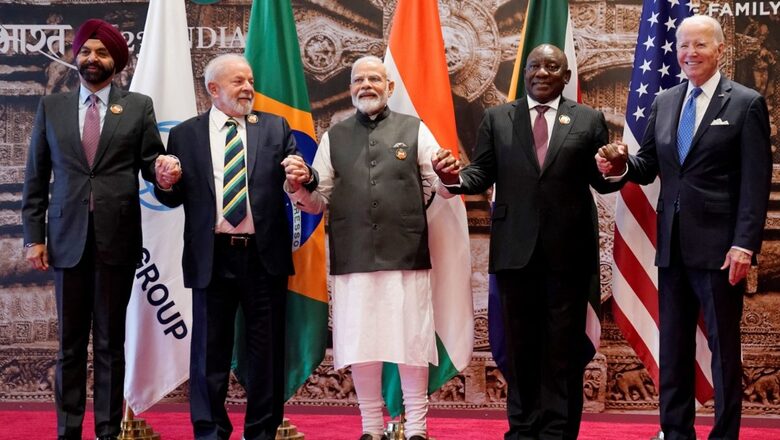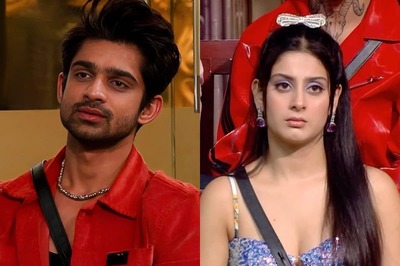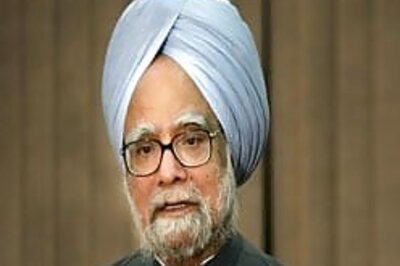
views
Of late, the moniker ‘Global South’ resonated in these parts of the world with Bharat pushing for thrust on developing and least developed countries hitherto grouped as G-77. Security analysts in particular were not very gung-ho about having this group as the biggest focus of the Indian G20 Presidency given that the block had China with extreme and expansionist plans.
But, if the G20 New Delhi declaration adopted by global leaders on Friday ahead of schedule is any indication, Bharat’s Presidium ambitions, strategy and thrust seem to have worked around a ‘very fine balance’.
Prime Minister Narendra Modi’s leadership and tenacity carried the day contrary to Western analysts’ summation that the New Delhi leaders’ summit was a ‘wash out’ and there would be no ‘declaration’. They pointed to a deep divide between Western leaders and China, Russia standing their ground on the Ukraine War. Bharat and Modi seem to have achieved virtually the impossible with a hundred per cent consensus on an 83-paragraph-long declaration that was approved by presidents and prime ministers. And, PM Modi hit the gavel signalling a fruitful deal of ‘healing, harmony and hope’.
This proved many Western analysts wrong as they seem to have underestimated Bharat’s leadership, Modi’s affable nature and posturing at G20 that accounts for 85 per cent of economic output and 75 per cent of world trade. Several commentators had seen the latest declaration as a ‘climb down’ for the Western powers giving Russia leeway or letting it off easily on Ukraine. That may not be the case.
The US and Europe may have taken a tactical one step backwards while consenting to the declaration including key lines on ‘war in Ukraine’. In fact, the New Delhi declaration is an extension of what was clinched at Bali in November last year. Finding ground to clinch a ‘declaration’ and keep the G20 relevant and kicking could be one interpretation. Not having a declaration was perhaps not an option or in the best interest of the global economies that are dangerously struggling to stay afloat in the aftermath of Covid-19.
The declaration demonstrates Bharat’s heft to move world powers. The personal bonding that Prime Minister Modi established with world leaders seems to have worked wonders in taking forward an ambitious economic and development agenda that’s inclusive and ambitious.
Western powers seem to have not lost the message after the last-minute pull-out of Chinese President Xi Jinping from the New Delhi summit. In fact, this led to acerbic comments from US President Joe Biden that Beijing had the option of being a ‘spoilsport’.
The world community especially Western Europe and the US could not have ignored finalising a roadmap to pressing issues like poverty alleviation, transition to green energy, restructuring debt of several poor countries that have become bankrupt and digital public infrastructure and crypto currencies etc.
Bharat stood like a solid rock in balancing countries, groups and blocs’ aspirations, especially the G7 and BRICS, Russia and China which led to the virtual pulling apart of the G20 summit. And let’s not forget that China got a taste of its own medicine with the announcement of Bharat, Middle East, Europe rail and roads spread economic corridor that includes the United States. India, the US, Saudi Arabia, the UAE, France, Germany and Italy heads standing together to announce this huge infrastructure-driven economic project. It rivals the now-jinxed Belt and Road Initiative (BRI) of China that pushed several developing countries into bankruptcy under unsustainable debt burdens. The project envisages establishing rail, road and under-sea data connectivity lines from Mumbai to Western Europe running through shipping lines to Europe. This direct challenge to China comes at a time when BRI’s tenth anniversary is being celebrated by Beijing. Interestingly enough, the stakeholders in Bharat, the Middle East and the EU economic corridor will come up with a roadmap for the project in 60 days along with funding plans. Apart from the China angle, Bharat may not have to depend on yet another uneasy neighbour, Pakistan, to establish over-land and under-sea linkages with Europe.
In the melee of Ukraine war-centric conversation, the induction of the 55-member African Union into G20 may have gone off very lightly. But, its significance is too huge to ignore. Bharat playing a key role in bringing the African Union on board the coveted club is something to write home about.
This is the first time that G20 got into expansion mode after its formation in 1999. Most importantly, the African Union will be a full permanent member of the G20 and equals the status enjoyed exclusively by the 27-member European Union block till now. African Union’s induction into G20 also explains India voicing the ‘Global South’ moniker in recent times.
Yet another interesting outcome is the setting up of a bio-fuels alliance on the lines of the International Solar Alliance which provides a sharper focus on energy consumption transition, especially in transport services and households globally. The 19-countries group is expected to push for a shift in environment-friendly alternatives and environment-friendly fuels in an effort to decarbonise economic expansion happening globally.
G20 Presidency, tactical positioning, hard play in diplomacy, and soft showcasing of Bharat’s cultural, civilisational and philosophical connect with humanity apart from hard gains made from the leaders’ summit will ring in for long.
The author is Director & Chief Executive, Centre for Integrated and Holistic Studies, a New Delhi based non-partisan think tank. Views expressed in the above piece are personal and solely that of the author. They do not necessarily reflect News18’s views.




















Comments
0 comment